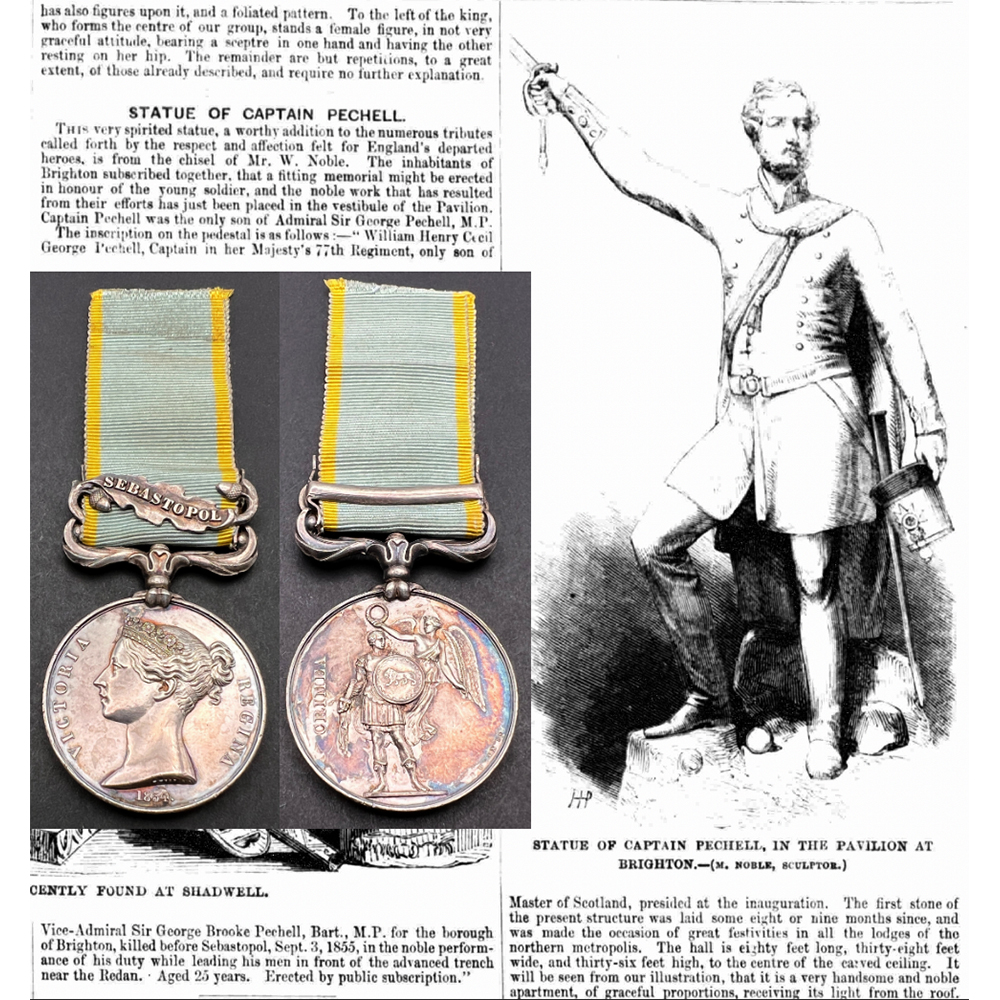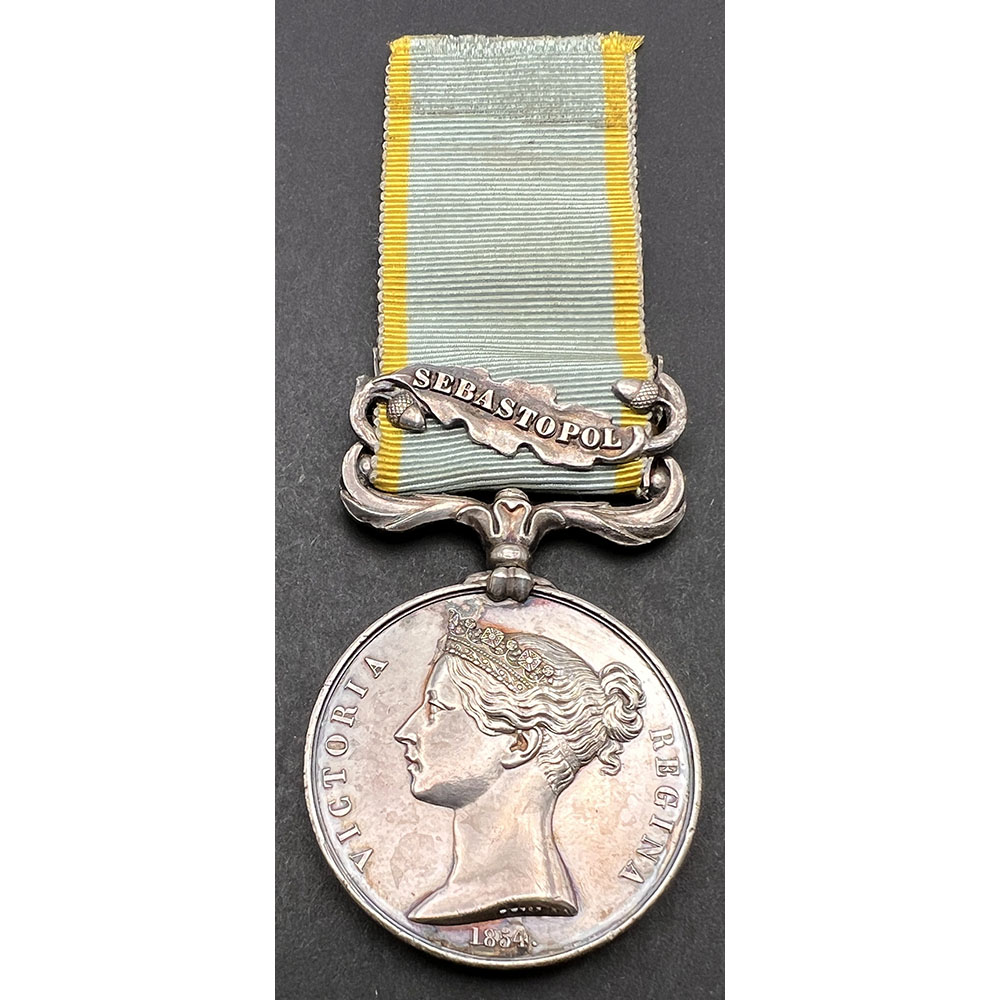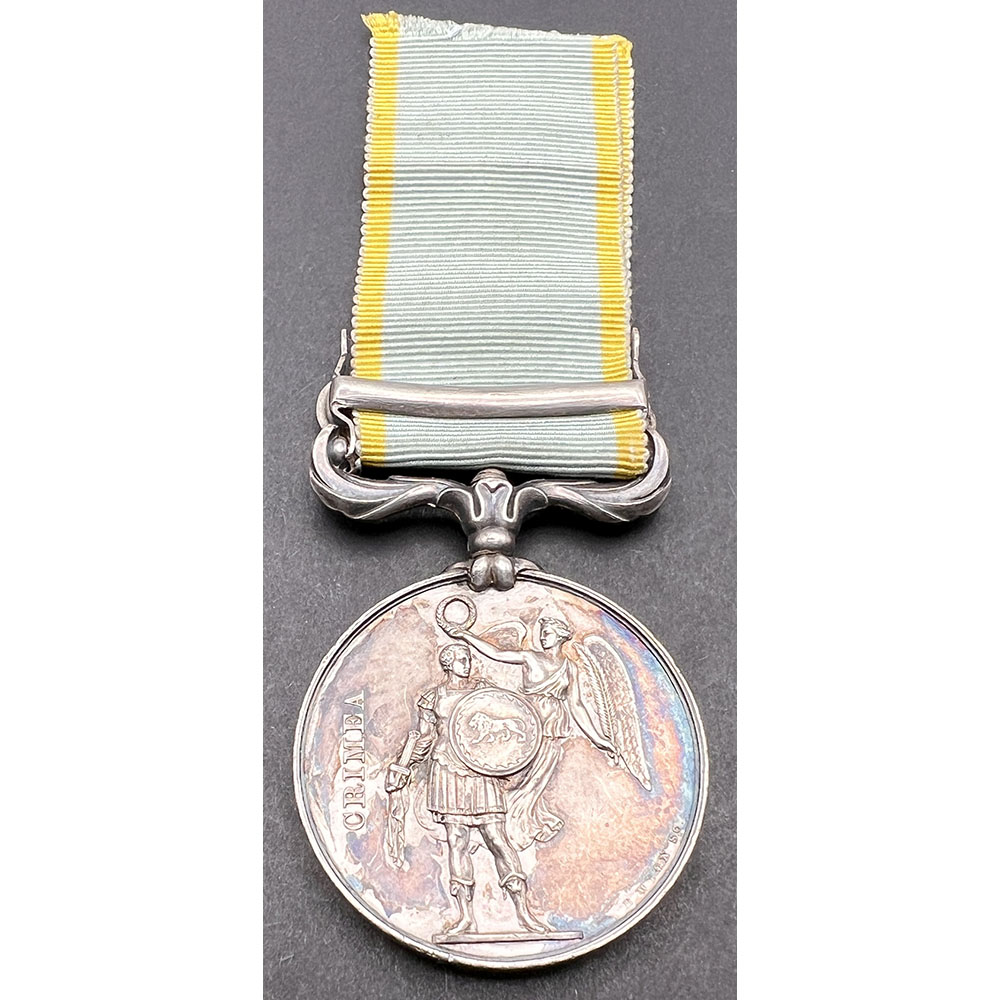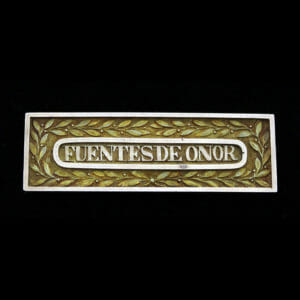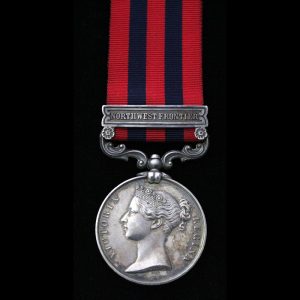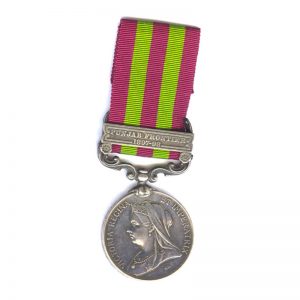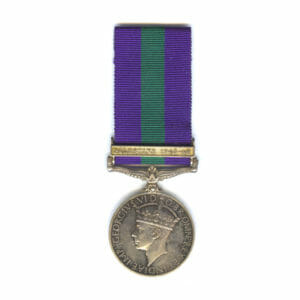Description
Crimea Medal, bar Sebastopol, Captain W.H.C.G. Pechell, 77th Foot, a beloved officer Killed in Action leading his men at Sebastopol in an attack having been MID 3 days earlier for the same place.
Officially impressed: “CAPTn W.H.C.G. PECHELL 77th FOOT.”
Provenance, ex Payne Collection 1911, mentioned in his handbook as one of his medals.
3 Times photographed by Roger Fenton during the war, available online as part of the Royal Collection.
Click here to view the photograph of him by Roger Fenton
Click here to view a photograph of him on horseback in Crimea
Mentioned in Despatches, London Gazette, 19th September 1855, for services on 30th August 1855 where he dislodged a Russian force with a Bayonet charge, returning there 3 days later for another round, he was then shot through the heart leading his men, being instantly killed.
The Records of the 77th Regiment recall his bravery in detail:
“August 30th – For the trenches this evening, 4 Captains, 4 Subalterns, 20 Sergeants and 505 Rank and File.
50 Men of the above party were sent forward under Captain Pechell to a boyeau which was being constructed at right angles to the 5th parallel under the proper left face of the Redan.
About 200 Russians made a sortie, to drive workmen away from the Bayeau. They had nearly succeeded in their attempt when Captain Pechell at the head of his party charged them with the Bayonet, and after an obstinate contest he defeated them, and recovered some gabions which they had taken.
The Russians were handled so roughly in this encounter that they did not return during the night, and Captain Pechell held the boyeau, under a severe fire, until morning, when he was relieved by a party of the 97th Regiment.
This was considered such a gallant feat of arms that Captain Pechell was honourably mentioned by the Commander-in-Chief in his despatches for his conduct on the occasion and no doubt he would have been promoted to the rank of Brevet Major had he lived, but most unfortunately for the regiment and the Service, he was killed on that very same spot 4 nights after.
September 3rd – When this party arrived in the trenches the General in Command was very anxious to have some sentries posted in advance of the boyeau, which Captain Pechell had defended so gallantry a few nights before.
Captain Pechell immediately volunteered for that duty, and his services were accepted.
He went out with a Sergeant and 4 Double sentries, hoping to gain the shelter of an old wall for his men, before the enemy occupied it, for the night; but the Russians were there before him, and as the English Party approached they fired one volley, which killed Captain Pechell, Sergeant Laughlin, and 2 men, wounding 3 others.
The enemy held the wall and an adjacent rifle pit for the night.”
His life from the Gentlemen’s Magazine circa 1856.
“CAPT WHC PECHELL
September 3rd 1855, Killed in the trenches before Sebastopol, aged 25, Captain Wiliam Henry Cecil Pechell, 77th Regiment, the only son of Rear Admiral Sir George Brooke Pechell, Baronet, MP for Brighton, by the Honourable Kathrine Isabella Bishop, second daughter of Cecil, Late Lord de la Zouche.
Having received his education at harrow and at Sandhurst, he entered the army in August 1848.
He had served during the winter campaign in the Crimea. After the attack on the Redan on the 18th of June, he was offered by Prince Albert a commission in his Royal Highness’s Regiment of Guards, but the high position that he held then in the 77th, induced him to remain at the post of both Danger and Honour.
He was unmarried and his death leaves his cousin, George Samuel, son of the late Capt Samuel George Pechell R.N. as the next heir to the Baronetcy.”
Captain William Henry Cecil George Pechell, 77th Regiment of Foot, was the only son of Admiral Sir George Richard Brooke-Pechell (1789-1860) and Heir to the Pechell Baronetcy of Paglesham in Essex, now extinct as of 1984.
His service began as an Ensign in the 77th Foot, on 1st August 1848.
Promoted Lieutenant, 25th July 1851.
Promoted Captain, 13th May 1853.
“On the night of the 30th ult, the Russian picquets made a rush at our advanced trench, upset a few gabions, and unfortunately killed Lieutenant Preston of the 97th Regt.
In this affair, Captain Pechell of the 77th Regiment, who commanded the advanced party, and Lieutenant Colonel Bunbury, 23rd Regiment, who commanded the Supports, behaved with great gallantry.” – Lieut Gen Simpson’s Despatch, 1st September 1855.
“From the heavy fire maintained by the enemy on the head of our sap, the progress has been slow, and accompanied, as must be expected, by several casualties among the sappers and working parties: and it is great regret that I have to report the death, last night, of Captain Pechell, 77th Regiment. Whose conduct I had occasion to bring before your Lordship’s notice in my despatch of the 1st.” – Lieut Gen Simpson’s Despatch. 4th September.
The letter sent to his father, Sir George Brooke-Pechel on 13th September 1855:
“Sir – I am directed by the General Commanding in Chief to state that he has not hitherto addressed the death of your Gallant Son, Captain Pechell, of the 77th Regt., who was killed in the trenches before Sebastopol on the night of the 3rd inst, being unwilling to break upon your family in the first moments of their affliction; but the honourable mention made by General Simpson in his despatch which was published in the Gazette of yesterday evening of the conduct of your son in repelling with a detachment of the 77th Regt, a sorties by the Russians on the advanced trench on the night of the 30th August, now induces his Lordship to assure you of the high estimation with which he regards the service performed by those troops, and the distinction which your son had acquired in command of them.
While this service, the report of which has followed by some days the telegraphic accounts of your son’s death cannot but add to the regret for the loss which the army has sustained in an officer so much promise, Lord Hardinge trusts that he may offer to you as some consolation that your son’s memory will ever be cherished by his regiment and the troops with which he has been serving with that respect and affection which his gallantry and devotion to the service could not fail to inspire.
I have the honour to be, Sir, Your Most Obedient Servant, C. Yorke.”
THE DIARY AND LETTERS OF CAPTAIN BILL PECHELL
According to an article in the Argus, published during 2003, the personal diary, letters, drawings, newspaper cuttings and photographs which belonged to him were unearthed by his descendant John Fitzroy Pechell Somerset and his wife Marigold.
Captain Pechell was a prolific writer of letters and they gave a vivid account of a soldier’s life in the Crimean War, he had written his final letter on 1st September 1855, just after he had commanded his men and been mentioned in despatches.
His letters were looked into by Professor Holly Furneaux, Reader in Victorian literature at the University of Leicester, who wrote the book, “Military Men of Feeling. Emotion, Touch, and Masculinity in the Crimean War”.
In the book there are a number of interesting extracts from his letters, giving some perspective of the on the ground experiences of the regiment, he exclaims in one letter that “We do not know that least of what goes on and look to The Times for Crimean news.” “We know less here of what goes on that you do at home.”
HEADLESS BILL THE STATUE OF CAPTAIN PECHELL
His father, had been the stalwart Member of Parliament for Bristol for years, and after the town heard of his only son and heirs death they gathered subscriptions from the locals of Bristol.
They commissioned a brilliant statue of him with his sword held high, which was for many years on display.
The statue is still around today
Click here for an article from 2015 about the statue by James Mulraine
THE FAMILY HOME OF CASTLE GORING
Bought by his father in the 1820s, a young Captain Pechell would grow up in the estate of “Castle Goring.”
The quite ludicrous, Half Castle Half Italian Villa, features two distinctive sides, one half resembles Arundel Castle, a grand Gothic design, with the south side featuring Greco-Palladian styled yellow brick, which was copied from the 16th Century Villa Lante near Rome.
A grand home steeped in tragedy, having been built in the 1790s by the Architect John Biagio Rebecca for Sir Bysshe Shelley, 1st Baronet. He had intended for the “Castle” to be the ancestral home of the Shelleys, and to be inherited soon by his grandson, the famous poet Percy Bysshe Shelley.
However young Percy died in a boating accident during 1822, leaving behind his wife Mary Shelley
